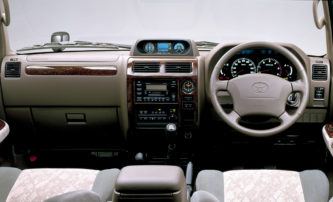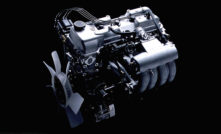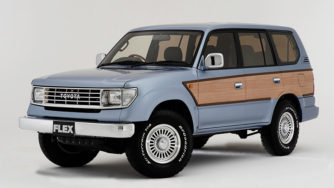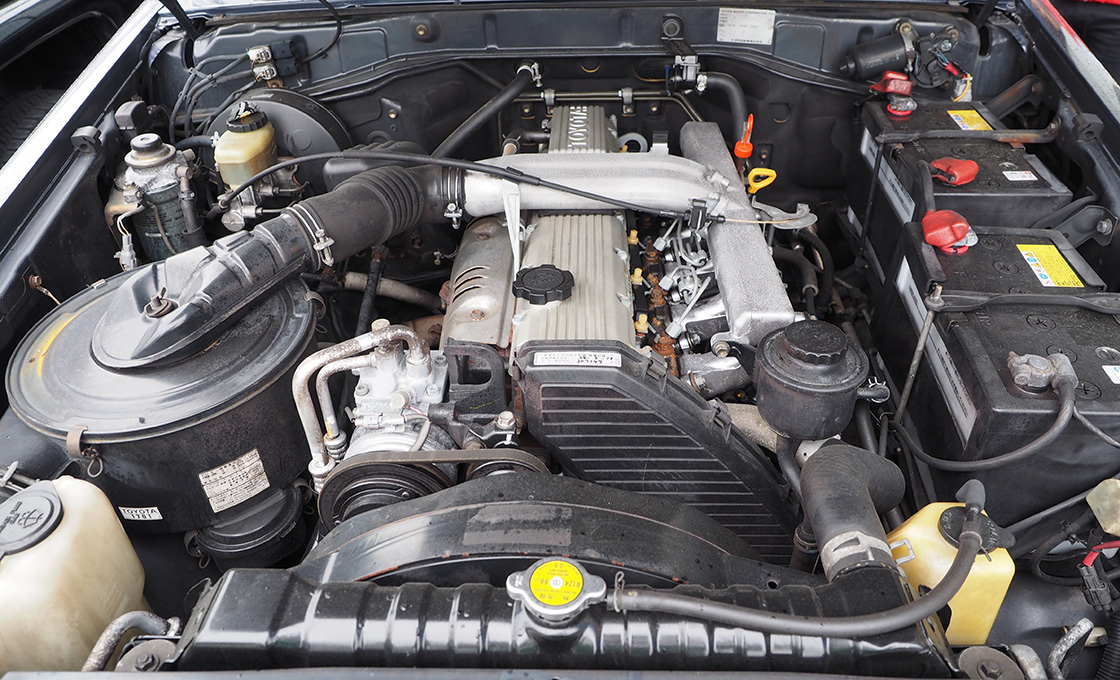The 70 Prado and the 90 Prado: both extremes in personality and style.
In the 1990s, when Land Cruiser’s 70 Prado and 90 Prado were sold as new cars, many cars such as 4WDs and RVs were popular due to the economic bubble. As the body design changed dramatically and the premium quality of high-priced vehicles increased, there was a desire for a model that was even easier to drive and easier to ride in, so Toyota brought us the Land Cruiser Prado.
The first Prado was the LCV70 Prado, which was introduced in April 1990. Based on the practical Land Cruiser 70 van, the displacement of the diesel engine was reduced, and the suspension was changed from leaf springs to coil springs. The interior was upgraded to a more passenger car design, color was added to the instrument panel and door trim, and the headlamps were placed at the corners of the mask, which gave it a friendly face.
The Land Cruiser 90 Prado, which appeared in May 1996 as the successor to the Land Cruiser 70 Prado, was redesigned from the skeleton to the design body from the inside to the outside. In addition to the diesel engine inherited from the 70 Prado, a new gasoline engine was also added. It had an increased degree of sophistication as a passenger car. The Land Cruiser 70 Prado and 90 Prado are very different in style and structure as cars.
Here, we will explain the differences and the points to consider when purchasing one.
70 Prado and 90 Prado Compare designs and sizes

The size of the interior space is almost equal
The Land Cruiser 70 Prado and the Land Cruiser 90 Prado have indistinguishable styles. The differences lie in the interior equipment and some of the body design. The body of the 70 Prado is the same as the 70 van except for the mask and the engine compartment. The front window is steep with a square silhouette. Over fenders are on the 3-number (ordinary car) body, but like the 70 van, it has a compact car-sized body, but because it is square, the interior is spacious. The steep front window gives the driver a wide view, and the front and the back are spacious.
The 90 Prado has a clean, sharp body with sharp corners, and the front window is also tilted considerably, making it stylish. Since the body size is wider than the 70 Prado, the interior space is expanded even with the slopes. The front and the rear instrument panels are thicker than the 70 Prado, making them more three-dimensional, but because of the evolution of body design technology, the front and rear interior space is almost the same as the 70 Prado.
Do you prefer a retro square or a modern sharpness? There are different tastes as far as body designs go, but it is safe to say that the body size and interior space are almost the same in both vehciles.
| Car Model | Land Cruiser 70 Pardo | Land Cruiser 90 Pardo |
|---|---|---|
| Sales Period | April 1990-April 1996 | May 1996 to September 2002 |
| Full Length | 182 inches | 185 inches |
| Width | 70 inches | 72 inches |
| Height | 75 inches | 75 inches |
| Minimum turning radius | 240 inches | 224 inches |
| Vehicle Weight | 4,189 – 4,365 pounds | 3,836 – 4,498 pounds |
| Boarding Capacity | 8 people | 8 people |
| Engine Type | Gasoline: No setting Diesel: 2.5L (straight 4 turbo: 2L-T) → 3.0L (straight 4 turbo: 1KZ-TE) | Gasoline: 2.7L (straight 4: 3RZ-FE) / 3.4L (V6: 5VZ-FE) Diesel: 3.0L (straight 4 turbo: 1KZ-TE) → 3.0L (straight 4 turbo: 1KD-FTV) |
| 4WD system | Part-time | Full-time |
| MSRP | $17,528 – $22,875 | $18,953 – $25,081 |
*70 Prado, 90 Prado, and 120 Prado each have 4-door specs.
Body size is a typical final model (excluding optional equipment, etc.)
*Vehicle weight does not include optional equipment
*The price when new is the manufacturer’s suggested retail price (tax included) of the final model.

70 Prado and 90 Prado engine comparison
I want to compare the diesel and gasoline engines based on robustness rather than economy
Land Cruiser 70 Prado’s direct 4 diesel turbo engine is a 2.4 liter in the early model (until April 1993) and a 3-liter in the late model (May 1993). On the other hand, the Land Cruiser 90 Prado has the same 3.0-liter diesel turbo as the 70 Prado late model does, and two models, a 2.7-liter straight 4 gasoline engine and a 3.4-liter V6 gasoline engine have been added.
The characteristics of each are that the 2.4-liter diesel turbo is one or two ranks lighter than the others in terms of Japan’s automobile taxation, but it is a little lacking in power for the 4-door 70 Prado.
The 3.0-liter diesel turbo was so robust that it was called a masterpiece at the time, and the difference in performance between the two diesel turbo engines is clear.
The 2.7-liter gasoline engine was chosen most with the 90 Prado’s most popular trim level, the 5-door TX. The 2.7-liter has a light nature and turns well, and you can enjoy lively driving with the 3-door model, but it is undeniable that in the heavy 5-door model it lacks power.
The 3.4-liter V6 petrol engine doesn’t feel lacking at all as the heart of the 90 Prado. The torque isn’t too bad and it’s not particularly dense, but it turns well, so I have the impression that it is powerful. However, because of the vehicle weight, none of them are fuel efficient compared to modern engines.
In particular, the diesel turbo engines of this period focused on output characteristics rather than fuel efficiency and emissions standards in a highly competitive market. Vehicles equipped with V6 gasoline engines and 3.0-liter diesel turbo engines are not very economical now, but they are recommended because they are easy to handle and have performance that delivers.
70 Prado and 90 Prado undercarriage comparison

“Off-road performance & freedom of customization” vs. “high-speed performance & comfort”
The suspension of the Land Cruiser 70 Prado is a combination of rigid axles and coil springs on both the front and the rear. On the other hand, the Land Cruiser 90 Prado has a double wishbone independent suspension and coil springs at the front, and a rigid axle and coil springs at the rear. The front suspension format is decisively different between the two, but the 70 Prado is a traditional truck-like style with only the springs changed to improve ride comfort.
The 90 Prado pursues stability that prevents swaying at various speeds and straightforward handling. It is difficult to make a comparison because it was developed in a different era and the format is significantly different, but the 90 Prado has a better total balance and a suspension for the times.
However, in the custom world, things look a little different. With the 70 Prado, it is easy to replace the springs and it has a high degree of space for lift-up kit. The 90 Prado cannot be lifted up like the 70 Prado. Even when driving off-road, the front suspension is often a hindrance. However, if you make full use of aftermarket parts, you can create a custom style on your Prado 90 that is equivalent to the 70 Prado in exchange for on-road driving performance and ride comfort. In general (more or less), the 70 Prado can be equipped with a lift-up style and is good for off-road driving, and the 90 Prado has a comfortable ride even at high speeds.
70 Prado and 90 Prado custom style comparison

Custom parts are rich in lift-up and retro style
Custom aftermarket parts for the Land Cruiser 70 Prado and 90 Prado have decreased considerably compared to new car sales. However, the most popular custom parts are still easy to obtain. There are still plenty of options for suspension parts such as springs and shock absorbers, as well as tires and wheels, and the Land Cruiser 70 Prado has a surprisingly rich selection of grills and headlamp parts available to upgrade its retro image.
Even with the 90 Prado, customization that emphasizes the retro feel is attracting attention, so FLEX Land Cruiser dealers nationwide are working on original parts and customization. There is no need for you to worry about lifting, increasing tire diameter, or retro customizing.
Recently, FLEX’s original complete custom has been gaining attention, and the Land Cruiser 70 Prado “Land Cruiser 70 Prado / LESLIE”, and the Land Cruiser 90 Prado “American Classic” and “Color Bomb” are hot topics in the used Land Cruiser car market.
As mentioned above, the Land Cruiser 70 Prado and the 90 Prado, which are quite popular in a rich custom environment, are evenly matched in terms of ease of customization. Flashy exterior parts such as over fenders and bumper guards have decreased significantly; those types of customization have fallen out of style. Customizing the essence of the Land Cruiser, such as highlighting, drawing out and extending the Land Cruiser’s characteristics, matches the current market trends.

The diesel turbo engine needs careful maintenance
The Land Cruiser was developed to stricter standards than general passenger cars and is highly durable. It has common components, from the body, chassis, engine, transmission, and interior. There is a good reason why it has demonstrated its toughness in many overseas markets and is trusted by buyers. Older cars, however, are in dire need of maintenance and repairs. This is common to all cars, and the Land Cruiser is no exception.
As for the parts that are more likely to break as they get older in the Land Cruiser 70 Prado and 90 Prado, the big one is the engine. Since it is a used car, it is greatly influenced by how it was driven and the degree of maintenance that has been done, but there are things to worry about especially in aging diesel turbo engines.
First of all, there is data that the wear rate of the turbocharger is relatively high. Since it rotates at high speed, hundreds of thousands of times per minute, wear of the shaft and deterioration of the seal are concerns. If the shaft wears out, it may make noise or seize up due to insufficient lubrication.
Land Cruiser 70 Prado has a high price and a large number of used cars available
The Land Cruiser 70 Prado and 90 Prado are still widely available in the used car market because they are durable and long-lasting, and many owners have taken good care of their cars. The number of used cars in Japan is about 300 Land Cruiser 70 Prado and about 200 Land Cruiser 90 Prado. The reason why the number of used 90 Prado is less than the 70 Prado, even though the number of new car sales was overwhelmingly higher for the 90 Prado, is because many 90 Prado owners are keeping their cars longer. In the future, there should be more used 90 Prado.
Used car prices range from $2,850 to $19,238 for the 70 Prado and from $3,206 to $15,676 for the 90 Prado. The 70 Prado has a wider price range, and the result is that there are many high-priced models. For used cars, price differences indicate popularity differences. Especially for the Land Cruiser, which has a long life, the model year does not seem to be very important in determining the price. In addition, the 70 Prado is often custom-made, which is reflected in the price.




